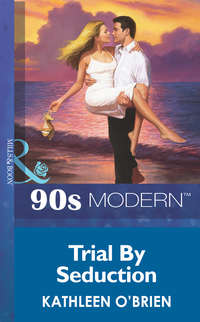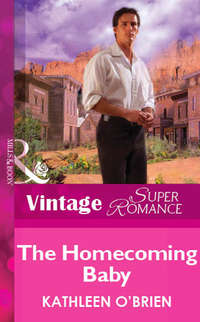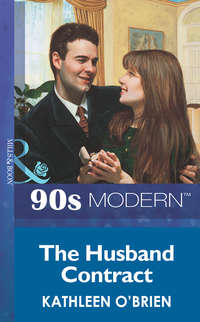
Полная версия
The Real Father
Where Radway had rung with the laughter of a hundred children and teemed with young, vigorous life, this place was almost preternaturally quiet. Black-armed oaks, drooping willows and barely budding dogwood crowded together, blocking all sound from the street. The winter sunshine fought its way through the tangled branches, but at a price. It lay like a broken thing on the grass, a fractured mosaic of white-gold light amid the olive-green shadows.
Molly hadn’t visited Woodlawn Cemetery in almost ten years, but she had no trouble finding the Forrest plot. It lay deep in the center of the seven acres of gray marble headstones and mildewed angels, deep enough to signify that the Forrest family had been in Demery since its founding.
Ten generations of Forrests lay beneath these silent trees. The carvings spoke of brave Confederate soldiers, some only sixteen years old when they were delivered here straight from battle. Headstones told of young mothers who died bearing Forrest infants, who then were brought here, too, lost to influenza or typhoid fever. More-modern graves were less tragic, reflecting long lives and easy passing. The natural ebb and flow of life.
Until she came to one of the newest graves, where someone had recently placed a bouquet of sweet peas. Until she read the headstone. Placed here less than ten years ago, its letters still formed fresh, sharp angles in the sparkling granite.
Beaumont Cameron Forrest. Cherished son, beloved brother.
Twenty-two years old the day he died.
Just twenty-two. For a disoriented moment Molly couldn’t make sense of it. Her handsome Beau, her older, more sophisticated hero…just twenty-two?
She had idolized him ever since she was eight years old, when he had chivalrously paused in his majestic twelve-year-old pursuits to rescue her doll from the creek. And yet Molly now was older than Beau would ever be. His twin brother, Jackson, was older now, too—almost thirty-two. No longer the identical twin.
Molly fought back an unfair flash of resentment that Jackson should have lived, aged, prospered, while Beau…
But this was what death did. It warped perspectives, inverted relationships, rendered obsolete concepts of older, younger, bigger, smaller. It froze you in time, forced others to go on without you.
She squeezed the flowers so tightly she could smell the sharp scent of broken stems. Her legs felt suddenly soft, as if the weight of her body would sink through them, driving her to the ground. She wondered irrationally if the earth would still be damp from all the tears she had cried in this spot ten years ago.
“I thought you might be here.” The dry, husky voice came from a mere three yards behind her, and Molly turned with graceless shock. She had believed she was alone here. She had certainly felt alone.
Lavinia Forrest, Beau’s aunt, stood there, watching. She looked exactly as she had looked ten years ago—the way she’d looked, in fact, for as long as Molly could remember. Tall, lanky, square-jawed. Dressed as always in slacks and jacket of no-nonsense navy blue, her straight white hair bobbed for maximum efficiency. She eyed Molly with her familiar candid scrutiny.
“You’re not crying,” Lavinia said matter-of-factly. “That’s good. No use crying over him, not after all these years.”
Molly smiled, strangely reassured by the older woman’s crusty manner. Though the whole world might tilt and sway, though strong, glorious young men might die too soon, some things, apparently, never changed.
“I was just about to head over to the church to meet you,” Molly said. “Am I late?”
Lavinia shook her head. “No. I finished early. I decided to let the other volunteers arrange the flowers for once. They could use the practice. Never saw so many women with five thumbs on each hand.” She dismissed the volunteer guild with one wave of her own long-fingered, capable, quintessentially Forrest hand. “But what is this sudden formality, little Miss Molly? No hug for an old friend?”
Molly murmured a wordless apology as she held out her arms and let herself be enfolded in Lavinia Forrest’s comforting embrace. Lavinia was unusually tall—it was a Forrest trait—so even though Molly herself was almost five-eight, she felt childlike beside the older woman.
It felt like coming home. Lavinia’s scent was so familiar—a mixture of clean soap and the natural earthy perfumes of a woman who loved to work with flowers. Through the years, Molly had enjoyed more hugs from Lavinia Forrest than she had from her own mother.
This hug was long and warm, and Molly sensed that it was Lavinia’s way of saying that she understood, even shared, Molly’s grief at the sight of Beau’s grave. Though Lavinia had loved her twin nephews equally, Beau had always been her favorite. Of course, Beau, with his sunny disposition and his charming manner, had been everyone’s favorite. Jackson had never gone out of his way to charm anyone.
The whole community had mourned Beau’s death, but Lavinia’s loss had been devastating. She had no husband, no children of her own, and she had lavished her stockpile of affection on the darling nephew who teased and flirted with her as no one else had ever done. Now that Beau was gone, Lavinia had only her flowers to spoil.
Molly knew that Lavinia would never speak openly of her heartache. It wasn’t in her vocabulary. But that was all right. This hug was eloquent, and it was enough.
Finally Lavinia broke away, clearing her throat roughly. “Well, then, that’s that. You’ve seen his grave. It stings a little, but you survived it. Now what do you say let’s get out of this gloomy place?”
Molly hesitated. Then, with a deep, steadying breath, she bent down and placed her bouquet of pansies neatly alongside the sweet peas that already lay at the base of the headstone. Her fingers were gratifyingly steady as she smoothed the ribbons that bound the blossoms together.
Straightening quickly, Molly brushed her hands together and met Lavinia’s uncompromising Forrest-green gaze squarely.
With a smile she took Lavinia’s arm and nudged her toward the path that would lead them back into the sunlight.
“You’re right, Aunt Lavinia. We’d better hurry and get that landscaping contract signed. It will be spring before you know it, and I’ve got about a million flowers to plant.”
JACKSON FORREST LEANED against an oak at the edge of the soccer field, watching as Tommy Cheatwood loped his way down the grass, way ahead of all the other boys, using those long, skinny legs to kick the stuffing out of the little black-and-white ball.
Tommy’s blond hair was standing up in wet spikes of perspiration, and his face was a flushed study in complete concentration. Sixty pounds of talent and intensity. As he reached the other side, he gave the ball one last, whopping thrust, sending it into the net, sailing neatly past the awkwardly flopping goalie.
Damn, the kid was good. Jackson whistled his admiration above the cheers of the watching parents. Hearing the familiar notes, Tommy looked back at him, grinning through the sweat, and the two males exchanged a thumbs-up.
But already Coach Riser was striding toward the boy, his clipboard tucked tightly under his arm. His glowering face didn’t seem to promise a congratulatory pat on the back. Tommy stood ramrod straight, awaiting his fate.
“What the heck was that, Cheatwood?”
Ross Riser’s voice was rough, the muscles in his neck rigid. Tommy stared at his coach, mute with misery.
Jackson found himself tensing, ready to jump between coach and player. What do you think it was? It was the go-ahead goal, you moron. But he didn’t say it. He knew better than to interfere, though every instinct was telling him to get in there and shove Ross Riser out of little Tommy’s face.
He tightened his jaw. Good grief. Had he turned into the typical overbearing, overprotective parent? Riser was just a volunteer coach, and he was doing the best he could. Jackson took a deep breath and waited. Tommy was a tough kid. He could handle it.
Coach Riser squatted in front of the boy, and, though he lowered his voice diplomatically, everyone could tell that Tommy was getting a verbal lashing. Jackson reminded himself of the hundreds of times his own track coach had lectured him with that same exasperated look on his face. But Jackson had been in high school, for God’s sake, not in fourth grade. And he’d been a…well, he’d been what was politely known as “a discipline problem.” Tommy wasn’t.
Besides, it was only a game. Ross Riser needed to lighten the hell up.
Annie Cheatwood, Tommy’s mother, had just arrived at the soccer field, peeling off her orange Low Country Hardware Store apron and tossing it into the back of her beat-up green sedan. Glad of the distraction, Jackson watched her pick her way through the crowd of mothers in tennis togs and diamond earrings, fathers in khaki slacks and golf shirts. Most of them spoke courteously to her as she passed, but the reserve in their faces told a different story.
Jackson knew that, if she hadn’t been a special friend of his, none of them would have offered her so much as a nod. A hardware store clerk who had the nerve to possess a large bustline and a small waist, and didn’t bother to hide either one, was ordinarily invisible to this crowd.
As Annie reached his side, Jackson found himself chuckling out loud at the idea of his being anyone’s social sponsor. He was the ultimate black sheep. These same people wouldn’t have spoken to him, either, if he hadn’t inherited his daddy’s plantation.
Annie looked puzzled, studying him as she folded a piece of Juicy Fruit into her mouth. “What’s so funny?”
He held out his hand, asking for a stick of gum. He didn’t chew gum, didn’t even like it, but he knew that the diamond moms and khaki dads thought chewing gum was vulgar, and the idea suddenly appealed to him.
“Life. People. Soccer. Chewing gum.” He shrugged. “Actually, just about everything seems pretty funny right now.”
She handed the gum over with a sideways smile. “Oh,” she said. “You’re in one of those moods. Great.”
As if he’d been pulled by a magnet, Coach Riser came striding over. His scowl had been replaced by a goofy grin, which Jackson realized was every bit as irritating. Riser had begun dating Annie recently, and he was clearly infatuated.
“Hi, there, you two,” the coach said, directing that lovesick smile toward Annie, but sending a perfunctory smile toward Jackson as if the two of them were good friends. Jackson knew better. Ross Riser didn’t quite know what to make of Jackson’s friendship with Annie, but he definitely didn’t like it. And the whole issue of Tommy confused and alarmed him, though he wasn’t close enough yet to Annie to ask her to explain it.
“Hi, Ross,” Jackson broke in before Annie could speak. “Tell me, coach, what’s your problem with Tommy? Didn’t you want him to score? Don’t you want us to win?”
Riser’s pale skin flushed, and his brown eyes tightened. He eyed Jackson narrowly, as if he feared a subtle threat lurked beneath the innocent words. As if Jackson might be referring to Riser’s one shameful secret, which darkened the air between them like a shadow every time they met.
But Jackson kept his expression bland, and Riser relaxed, obviously deciding that, this time at least, no deeper implications had been intended. “Not like that, I didn’t,” he said. “I’ve told Tommy not to go galloping down the field all alone. He’s a team player, and he needs to wait for his team.”
“Even if they’re half an hour behind him?”
Riser’s voice hardened. “That’s right, Forrest. Even then. You have a problem with that?”
Annie groaned and swatted lightly at Jackson’s arm. “Knock it off, you two. If I’d wanted to get caught in a macho slime-fest, I would have stayed at the hardware store.”
Jackson grinned. “Sorry,” he said, recognizing the truth of her comment. He wasn’t going to get into a wrestling match with Ross Riser over how to handle Tommy. Or over Annie, either, for that matter. Frankly, he didn’t have to.
“Whatever you say, Ross,” he offered with an easy shrug. “You’re the coach.”
Annie patted his cheek. “Good boy,” she said. Then she turned to Ross, whose handsome face had already begun to darken again. “Are we still on for Friday?”
Ross nodded, glancing covertly at Jackson. “You bet we are. I’ll be there at six.” And then, with an awkward lurch of boyish defiance, he leaned over and pecked Annie on the lips before turning and hurrying back toward the field.
Annie and Jackson watched the game in a pregnant silence for a couple of minutes. Finally Annie spoke.
“I know you don’t think I should be seeing him.”
Jackson kept his eyes on Tommy, who was reining himself in and staying with the pack. What a shame. “That’s right,” he said. “I don’t.”
Annie made a small popping sound with her chewing gum, something she never did unless she was angry. “But, doggone it, Jackson, you haven’t got any right to tell me who I can and can’t see.”
Jackson nodded. “That’s right,” he agreed equably. “I don’t.”
Annie growled, obviously losing patience with him. “Listen here, Jackson Forrest. You’d better come on out and tell me what your problem is with Ross, or you’d just better hold your tongue and stay out of it.”
He swiveled, slanting her a laughing glance. “Think back, Annie, darling. Did I say a word against Ross? I think this topic was your idea, not mine.”
She narrowed her eyes, considering. He could tell when she realized he was right—her hazel eyes began to flash. Annie hated being wrong.
“Yeah, well, you didn’t have to say anything, did you? You know I can read your mind. You don’t like Ross, Jack. I want to know why.”
The chilly February wind had blown pieces of her hair up against her flushed cheeks. Jackson reached out and gently tucked the fine, light-brown strands back behind her ears. “Maybe I don’t think he’s good enough for you and Tommy. Maybe I think you deserve better.”
She looked unconvinced. “Yeah? Why, do you see the King of Siam standing in line to date me?”
“Annie—”
“I’m serious, Jack. I’m not exactly the catch of the century, you know, a single working mom.” She cast a wry gaze over the crowd of upscale parents. “Can you imagine any of these guys inviting me to the country club for dinner?”
“Annie—”
She shook her head, rejecting his assurances of her worth. She’d always hated soft soap and platitudes. “Besides, Jack, I’m just dating him a little, that’s all. It’s not as if I’m going to marry the guy. You don’t have to worry that he’s going to try to step in and be Tommy’s dad or anything.”
Jackson managed not to flinch, although she had hit a bull’s-eye with that one. Canny Annie. She always could cut right through to the truth of things. He turned toward the soccer field, as much to avoid letting her read his expression as to follow the progress of the game.
Tommy was working his way downfield, threatening to score once again. Jackson’s gut twisted a little, watching those bony, knob-kneed legs churn with every ounce of energy in the boy’s body. The kid had so much heart, so much spunk. He needed a dad. He deserved one.
“I’m sorry, Annie,” Jackson said. “You’re right. It’s none of my business.”
A moment’s silence. And then, slowly, her hand slid up and rested against his forearm. When she spoke her voice was softer, less agitated. “Besides you’ve got other things to worry about right now. Isn’t your old girlfriend supposed to show up at Everspring this afternoon? You know, that pretty, prissy girl from high school?”
Jackson frowned. “Beau’s old girlfriend,” he said curtly. Annie knew all this. What was she playing at? “Not mine. Beau’s.”
Annie tucked her hand cozily into the crook of Jackson’s arm. “Right. Whatever,” she said. “If you say so.”
CHAPTER TWO
IT WAS A TYPICAL late-winter morning at Everspring Plantation—dull, lifeless, the doldrums season for gardeners. Too late for the red blush of berries, too early for the yellow splash of bulbs. Brown grass slept, still exhausted, under gray skies.
But Molly, standing on the mossy brick steps of the old plantation kitchens staring down toward the banks of the slow-moving river, didn’t see winter. Everywhere she looked, she saw flowers. She saw spring days banked high with azaleas, sprinkled with candy-colored tulips, crocus and lilies. She saw green summer acres bordered with pink phlox, white candytuft, blue columbine and crimson dianthus. She saw fall afternoons lit by chrysanthemums as fiery gold as candles.
And if she closed her eyes very tightly, she could see Beau, too, walking across those flower-filled lawns, coming toward her with the summer wind ruffling his silky blond hair, the sun lighting the intense green of his eyes. And a smile on his lips.
“Mom! Come quick!” Liza’s eager voice broke into Molly’s yearning daydream. “It’s a maze, just like in the puzzle books!”
Opening her eyes, Molly shook away the images, forbidding tears to even think about forming. How absurd of her to give in to maudlin sentimentality the very first moment she set foot on Everspring earth. This was why she had left Demery in the first place, why she hadn’t come back in ten long years. She knew that here at Everspring, where Beau had lived, where she and Beau had loved, the memories would be as overpowering as quicksand.
But she could resist it—and she would. She refused to live in the past, no matter how beautiful its gardens might have been. She was lucky. She had a life, a career, a future….
She had a child.
And she intended to give that child her full attention.
“Mom!” Liza stood at the opening to the thick, six-foot high maze, her fists planted on her boyish hips with exaggerated impatience. “Come look! It’s so cool!”
Molly smiled. “It’s boxwood,” she said. “Little-leaf box, actually. It’s from Japan.” She always used playtime to teach Liza about plants. And at least half the time, Liza listened.
This wasn’t one of those times. Ignoring the botany lesson, Liza grinned as her mother drew closer. Her eyes sparkled with mischief. Suddenly, she reached out and tapped Molly’s arm.
“You’re it!” she cried triumphantly, and then she started lithely into the maze, disappearing immediately behind its leafy walls.
Molly hesitated only a second before taking off after her. Liza’s legs might be younger, but Molly had the advantage of familiarity. She knew every twist and turn, every blind end, and every secret pass-through. At eleven, she had cleverly eluded Jackson, who was always chasing her through the maze with a tree frog, a lizard or a garter snake in his hand.
And at sixteen, she had allowed Beau, sexy, laughing Beau, to catch her.
She heard Liza just ahead, giggling. The sound was infectious. She laughed, too, giving herself over to the pleasant adrenaline rush of the chase, the cool, invigorating feel of wind across her cheeks.
“You can run, dearie,” Molly called out in her best movie-villain voice as she rounded the second left turn, scuffing the boxwood with her shoulder in her haste, “but you can never hide!”
An answering squeal told her Liza was just around the next turn. She turned up the speed, and she was already stretching out her hand for the capture when she heard a sudden thump, and a small, high shriek of fear.
“Liza!” She took the corner with her heart knocking at her throat. Liza…
She froze in her tracks, which, she realized with numb horror, was actually quite fortunate, because if she had kept running she would have collided with the man who stood there, holding a shocked Liza in his arms. Just as Liza had obviously collided with him.
She looked at Liza first, caring only if her daughter was safe. Then she looked at the man.
A small, breathless voice in her mind whispered the name on a sudden leap of joy.
Beau.
Her dreams had seen him just like this. The vivid-green eyes, the dark, proud arch of eyebrow. The squared chin, the shining thickness of waving blond hair. The long, capable fingers. She felt a sudden, familiar lurch of pure physical desire.
But finally, probably in no more than the space of a heartbeat, common sense clamped down on the wishful madness.
Of course it wasn’t Beau. Beau was dead. It would never be Beau again.
It was Jackson.
Her gaze clearing, she began to see the details. Like Beau, Jackson had always been devastatingly handsome. It was his birthright. Forrest males were always glamorous far beyond normal men.
And today he was, if anything, even more attractive than he had been at twenty-two. His athletic body was still lean and rangy—a runner’s body. While Beau had been the football hero, Jackson had been the high school track star. Quite natural, the gossips had suggested. He got plenty of practice running from sheriff’s deputies and outraged fathers.
He smiled now, watching her study him. The grin was as deeply dimpled and rakish as ever, but it was subtly different. It was as if the years had erased just a little of the defiance that had once been his hallmark.
“Hi, Molly,” he said, using that voice that was so like Beau’s—and yet so different. He bent down to Liza. “Are you okay? That was some crash. You must have been going about a hundred miles an hour.”
Liza grinned up at him. Molly winced at the sight of that familiar, dimpled grin. “Yes. I’m a fast runner,” she said proudly. “I hope I didn’t hurt you.”
He massaged his ribs dramatically. “I think I’ll live.” He straightened and met Molly’s gaze over the little girl’s head. “It’s been a long time, Molly. How are you?”
Her throat felt strangely dry. It seemed to take away her powers of speech to look at him like this. It was like looking at a ghost. A ghost who made her tingle, remembering things that hadn’t ever happened—at least not with him.
“Liza,” she said, touching her daughter’s hair softly. “Would you go out to the car, please, and get my purse?”
Liza looked confused. “What do you need your purse fo—”
“I’d really appreciate it,” Molly interjected, her voice still soft.
Liza got the message. She looked from Jackson to her mother once, curiously, but without anxiety. She smiled. “Okay.”
Molly watched her disappear back through the maze, and then, clearing her throat, she turned to Jackson.
“I was so sorry,” she said. “So terribly sorry about Beau.” She knew that wasn’t the best way to begin, but she couldn’t think of anything else. She hadn’t expected to find Jackson at Everspring. Lavinia had hinted that, as Jackson’s main address these days was New York—where he’d moved as soon as he’d been released from the hospital—he probably wouldn’t be in town during her own stay here. She wondered now whether Lavinia had deliberately misstated the case.
Whatever the reason, she had no speeches ready. Still, why was this so hard? It was just Jackson, the boy she’d played with since she was a child, the boy whose shoulders she had soaked in tears whenever Beau’s careless ways had broken her heart.
“I can’t appreciate the magnitude of your loss, of course, but I—” She took a deep breath, hating the stilted expressions that seemed to spout unbidden from her lips. “I loved him, too, Jackson. I loved him desperately.”
He nodded. “I know you did.” His eyes took on some of the old sardonic quality. “And blindly, too, if I remember correctly. But hey—” he cocked that disarming smile at her, and suddenly the mockery was gone again “—didn’t everyone?”
The sound of Liza’s favorite nursery rhyme jingle broke into Molly’s response, the little girl’s high, clear notes making their way like birdsong through the boxwood wall.
Jackson looked toward the sound, then slowly turned his gaze back to Molly. “I don’t have to ask if she’s your daughter, do I?” He smiled. “She’s exactly like you at that age.”
Molly took a deep breath. She knew the similarity was dramatic. Molly had been lanky, too, always outgrowing her clothes just like Liza. And both of them had identical wispy blond hair, wide-set blue eyes, and fair cheeks that pinked at the slightest breeze.









